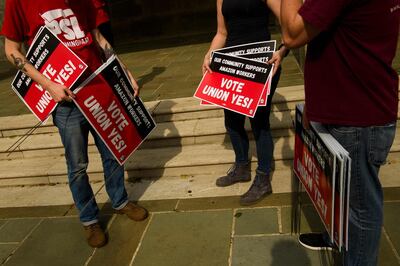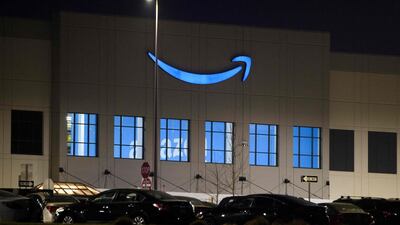Amazon has secured enough votes to block a union effort at a warehouse in Bessemer, Alabama, proving its might and cutting off a path that labour activists had hoped would lead to similar efforts throughout the online shopping company and beyond.
The company crossed the threshold to secure a majority of votes, with 1,798 warehouse workers rejecting the union and 738 voting in favour.
The National Labour Relations Board oversaw the process.
A total of 3,041 votes were cast, 505 of which were contested by either Amazon or the Retail, Wholesale and Department Store Union, which led the organising efforts in Bessemer.
The union said it would file an objection with the board charging the company with illegally interfering with the union vote. It will seek a hearing to determine if the results “should be set aside because conduct by the employer created an atmosphere of confusion, coercion and/or fear of reprisals".
The union accused Amazon of spreading disinformation about the unionisation effort at meetings that workers were required to attend.
“Amazon has left no stone unturned in its efforts to gaslight its own employees."
The union push was the biggest in Amazon’s 26-year history and only the second time that an organising effort from within the company had come to a vote. But Bessemer was always viewed as a longshot since it pitted the country’s second-largest employer against nearly 6,000 workers in a state where laws do not favour unions.
That the labour movement in Bessemer even got this far was unexpected.
Amazon has an undefeated record of snuffing out union efforts before they can spread. And at a time when the economy is still trying to recover and companies have been eliminating jobs, it is one of the few places still hiring during the pandemic, adding 500,000 workers last year alone.
But the pandemic also revealed inequities in the workforce, with many having to report to their jobs even while the coronavirus was raging, leading to concerns over health and safety.
The organising efforts in Bessemer coincided with protests happening throughout the country after the police killing of George Floyd, raising awareness around racial injustice and further fuelling frustration over how workers at the warehouse – more than 80 per cent of whom are black – are being treated, with 10-hour days of packing and loading boxes and only two 30-minute breaks.
Workers in Bessemer approached the union last summer about organising and the momentum had been building ever since. The union push was thrust into the national spotlight, attracting the attention of professional athletes, Hollywood stars and high-profile elected officials, including President Joe Biden.
Stuart Appelbaum, the president of the Retail, Wholesale and Department Store Union, struck a grim tone in a statement on Thursday night as the initial results rolled in, signalling that the union will put up a legal fight if the vote does not go its way.
“Our system is broken. Amazon took full advantage of that, and we will be calling on the labour board to hold Amazon accountable for its illegal and egregious behaviour during the campaign,” he said, without specifying any allegations.
“But make no mistake about it; this still represents an important moment for working people and their voices will be heard.”
Unions have lost ground nationally for decades since their peak in the decades following the Second World War. In 1970, almost a third of the US workforce belonged to a union. In 2020, that figure was 10.8 per cent, according to the US Bureau of Labour Statistics. Private sector workers now account for less than half of the 14.3 million union members across the country.
Richard Bensinger, a former organising director for the AFL-CIO and United Automobile Workers, noted the large number of workers who didn’t vote in Bessemer: “To me, that’s all about the paralysis, the fear. They don’t want to be supportive of the company but they are afraid to stand up for the union.”

Mr Bensinger, who said he is involved in early unionisation efforts by Amazon workers the US and Canada, spoke to a couple of those workers Thursday night “trying to tell them what happened so they wouldn’t be discouraged".
The National Retail Federation, the nation’s largest retail group, struck a tone of relief.
“The process works and employees can make an informed decision despite the enormous scrutiny under which this campaign was conducted,” said David French, a spokesman for the federation. “Union representation is a choice for workers, but many clearly prefer opportunities in a competitive marketplace that provides strong wages and benefits over the anonymity of a collective bargaining agreement.”
Despite this latest defeat, labour experts and union leaders believe the organising efforts in Bessemer could nonetheless inspire other Amazon workers to want to unionise at the company’s hundreds of facilities across the country.
Amazon did not respond to a request for comment.

